'Encanto': Colorful Characters, Intergenerational Trauma, and Fun Music
Disney's newest Latine animated musical, 'Encanto', features a super colorful cast, fun music, and a surprising conflict about intergenerational trauma.
From two-timing her love interests to stalking her mom on a date, Devi makes many more mistakes in season 2 of Never Have I Ever. It’s safe to say this season’s a lot messier–and it’s fantastic. Season 2 of Never Have I Ever explores the complicated lives of its diverse cast more in-depth than season one does, and it makes for an entertaining and enthralling time.
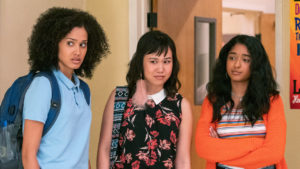
Devi’s friends, Eleanor and Fabiola, get juicier storylines in season two. In one of these storylines, Eleanor experiences her first toxic romantic relationship, while Fabiola struggles reconciling who she is with the type of lesbian others want her to be. It’s a fascinating look at sexuality and what it means for different individuals, and one that can easily resonate with audiences.
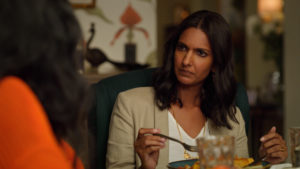
Nalini is expanded beyond the cold, nagging authority figure in Devi’s life that she was in season one. We get to see Nalini on her own, navigating her life without Mohan. She becomes a three dimensional character with her own wants and needs separate from Devi. She struggles finding a support system from her own family and ends up finding it in Mohan’s mother. She takes a break from grief for a romance with her colleague, Dr. Jackson, but it’s too much too fast. Nalini is allowed to make mistakes this season, much like Devi, and becomes a more compelling character because of her flaws.

Season 2 also introduces Aneesa, the only other Indian girl at school. Devi feels threatened by a new romantic and racial rival. When you don’t look like everyone else, that becomes what makes you special, identifiable. Being the only Indian girl at school became a part of Devi’s social identity, one that she clung to as a reason for why she wasn’t popular and as something that made her unique. Aneesa’s presence forces Devi to face the truth of her poor social status.
“Devi was in awe of this cool Indian teen. She had always assumed her unpopularity was because of racism, but this new kid was proving that Devi might just be objectively lame.”
However, Aneesa becomes a friend with shared cultural experiences (a relationship any marginalized person needs). Unfortunately, a jealous Devi outs Aneesa as anorexic. I wish the show had explored more of their friendship and Aneesa’s differences from Devi — she’s Muslim while Devi’s Hindu, she’s “sporty” while Devi’s “nerdy”. I’d love to see solidarity between two very different South Asian women and more of Aneesa being a practicing Muslim.
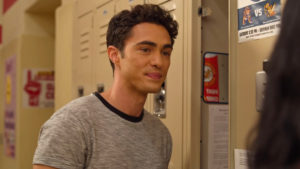
As for the boys, Paxton gets more development story-wise but remains a sex symbol onscreen. A ridiculous amount of screentime is spent objectifying him and there are quite a few “throwaway” lines about his body that made me extremely uncomfortable considering this character is supposed to be 16 years old (even if he is played by a 30-year old, which is a whole other discussion).
Eleanor: “His penis is too big.”
Fabiola: “He was wearing gray sweatpants at dropoff. My mom rear-ended a bus.”
The overt sexualization is combatted with better characterization. In the Paxton-centric episode, we get a glimpse into the life of a boy who has never been challenged to do more than the bare minimum. Devi pushes Paxton to go above and beyond in school, and he starts to. Touchingly, he learns about his heritage when he does a project on his grandfather’s incarceration in the World War II Japanese internment camps. Paxton’s self-improvement makes him Devi’s choice by the end of Season 2.
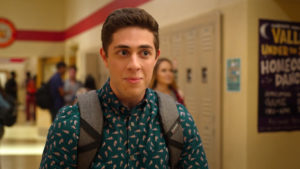
While I’m not complaining about Daxton, I have to pity Ben, who was left behind. Ben is so in-tune with Devi’s emotions that he knows how to comfort her when she’s upset and how to confront her when she’s done something wrong. Ben ends the season dating Aneesa but still pining for Devi, a situation that will surely become a big problem in the future.
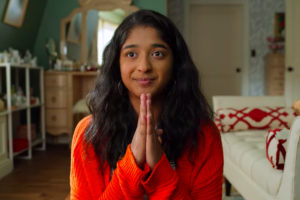
Devi is still grieving her father while trying to keep up academic success, navigate her romantic feelings for two boys, maintain her friendships, and be a good daughter. She’s got a lot on her plate, so it’s understandable that she’d make mistakes. Devi is one of the most flawed protagonists I’ve ever seen (and is often her own antagonist), but she’s also one of the most realistic teens I’ve ever seen on TV, and a brutally accurate portrait of grief. She’s amazing representation for second-generation Indian Americans. Devi is angry and loud unlike the stereotypical meek, obedient Asian women popular media tends to portray (something directly addressed when Devi tells Kamala to stand up for herself at work). While she is smart and cares greatly about academics (following the Asian “nerd” trope), this isn’t Devi’s entirely personality — she has a lot more going on beyond school. And the show surprisingly manages to balance the different parts of Devi’s life well, keeping it an addicting and dynamic watch.
“Never Have I Ever” is streaming now on Netflix.
Related lists created by the same author
Disney's newest Latine animated musical, 'Encanto', features a super colorful cast, fun music, and a surprising conflict about intergenerational trauma.
Related Movie / TV / List / Topic
Wild Child tells the story of a wealthy, spoiled teenage girl named Poppy Moore who lives in Malibu, California, who attends a boarding school in England. This film shows us how Poppy is first labeled as a fish out of water compared to her boarding school classmates, as she is a wild child, but eventually earns her roommates' friendships and respect.